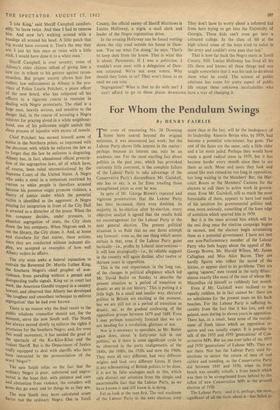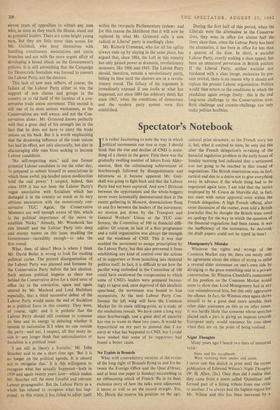For Whom the Pendulum Swings
By HENRY FAIRLIE
TEW costs of renovating No. 10 Downing Street have soared beyond the original estimates, it was announced last week; but the Labour Party shows little interest in the matter:
perhaps because its interest can only be an academic one. For the most startling fact about politics in the past year, which has provoked curiously little comment, is the complete failure of the Labour Party to take advantage of the Conservative Party's discomfiture. Mr. Gaitskell, one has to say, is as far from treading those strengthened joists as ever he was.
In spite of Mr. George Brown's repeated and vigorous protestations that the Labour Party has here increased, there even doubled, its majority in by-election after by-election, every objective analyst is agreed that the results hold no encouragement for the Labour Party at the next general election. The present political situation is so fluid that no one dares attempt any forecast: even so, the one thing which seems certain is that, even if the Labour Party gains tactically—i.e., profits by Liberal interventions— it will lose strategically—i.e., its reliable support in the country will again decline, after twelve or thirteen years in opposition.
This is the real importance, in the long run, of the changes in political allegiance which led Mr. David Butler on Sunday to describe the present situation as 'a period of transition as drastic as any in our history.' This is putting it a little high. In a small and insular way, electoral politics in Britain are exciting at the moment, but we are still not in a period of transition as drastic, say, as the gradual coalescing of the opposition groups between 1679 and 1688. Even I may perhaps tentatively forecast that we are not heading for a revolution, glorious or not.
Nor is it necessary to speculate, as Mr. Butler again does, about 'a forty-year itch in our politics,' as if there is some significant cycle to be observed in the party realignments of the 1840s, the 1880s, the 1920s and now the 1960s. They were all very different, had very different origins, and took very different forms. If there is any schematising of British politics to be done, it is not by false analogies such as this, which only distract our attention from the simple and ascertainable fact that the Labour Party, as we have known it and still know it, is dying.
Let us look at the men first. The real weakness of the Labour Party at the next election, even more than at the last, will be the inadequacy of its leadership. Aneurin Bevan who, by 1959, had become a potential vote-winner, has gone. The rest of the faces are the same, only a little older and a lot more jaded. Perhaps they would have made a good radical team in 1959, but it has become harder every month since then to see them as such. More and more they look and sound like men ruined by too long in opposition, too long waiting in the Members' Bar, the Har- court Room or the Members' Canteen for the electors to call them to active work in govern- ment. Even Mr. Gaitskell, still so much the most formidable of them, appears to have lost much of his intuition for governmental politics and, even more seriously, something of the keen edge of ambition which spurred him in 1959.
But it is the team around him which will be the real drag once the election campaign begins in earnest, and the electors begin scrutinising them as a potential government. I have not met one non-Parliamentary member of the Labour Party who feels happy about the appeal of Mr. George Brown, Mr. Harold Wilson, Mr. James Callaghan and Miss Alice Bacon. They are hardly figures who reflect the mood of the Sixties, or appear alert to its problems. They are ageing 'squares,' men rooted in the early fifties: almost exactly like most of the men of whom Mr. Macmillan rid himself so ruthlessly last month.
Even if Mr. Gaitskell were inclined to be equally ruthless, he in fact cannot be: there are no substitutes for the present team on his back benches. For the Labour Party is suffering in- curably from the fact that it has lost, and not gained, seats during its eleven years in opposition. There has, as a result, been none of the recruit- ment of fresh talent which an opposition re- quires and can usually expect. It is possible to talk of the 1955 and 1959 'generations' of Con- servative MPs. But no one ever talks of the 1955 and 1959 'generations' of Labour MPs. They are not there. Nor has the Labour Party used by- elections to secure the return of men of real calibre and standing, as the Conservative Party did between 1945 and 1950, when its front bench was steadily rebuilt, a front bench which was then to be strengthened from behind by the influx of new Conservative MPs at the general election of 1950.
The Labour Party----and it is, perhaps, the most significant of all the facts about it—has failed in eleven years of opposition to attract any men who, as soon as they reach the House, stand out as potential leaders. There are some bright young men, but they are little more than scouts for Mr. Gaitskell, who busy themselves with handling constituency associations and union branches and not with the more urgent affair of developing a broad attack on the Government's policies. It is still astonishing that the Campaign for Democratic Socialism was formed to convert the Labour Party, not the electors.
This lack of new men reflects, of course, the failure of the Labour Party either to win the support of new classes and groups in the country or to rid itself of the incubus of a con- servative trade union movement. This second is still one of its most serious weaknesses, as the Conservatives are well aware, and not the Con- servatives alone: Mr. Grimond knows perfectly well that a great deal of his strength lies in the fact that he does not have to carry the trade unions on his back. But it is worth emphasising that the deadening influence of the trade unions has had its effect, not only electorally, but also in discouraging able men from seeking to become Labour candidates.
'No self-respecting man,' said one former potential Labour candidate to me the other day, 'is prepared to submit himself to associations in which those awful, pig-headed union mediocrities hold the real power.' I suspect, indeed, that since 1959 it has not been the Labour Party's vague association with Socialism which has damaged it in the country so much as its very obvious association with the monstrously con- servative TUC. Again, the Conservative Ministers are well enough aware of this, which is the political importance of the move to establish `Nicky.' Already, Mr. Woodcock has run himself and the Labour Party into deep and stormy waters on this issue, enabling the Government—incredibly enough—to take the first round.
What, then, of ideas? Here is where I think Mr. David Butler is wrong to look for exciting political cycles. The present disorganisation of the Labour Party was planned and foreseen by the Conservative Party before the last election. Such serious political impetus as there was behind the Conservative drive for a third term of office lay in the conviction, again and again uttered by Mr. Macleod and Lord Hailsham especially, that a third successive defeat of the Labour Party would mean the end of Socialism as a political force in this country. They were, of course, right; and it is pathetic that the Labour Party should still continue to consume its time and its energy in debating whether it intends to nationalise ICI when no one outside the party—and not, I suspect, all that many in- side it—any longer think that nationalisation or Socialism is a political issue.
'I am still in theory a Socialist,' Mr. John Strachey said to me a short time ago. 'But it is no longer on the political agenda. It is absurd not to recognise that.' It is this willingness to recognise what has actually happened—both in 1939 and again twenty years later—which makes Mr. Strachey still the most forceful and relevant Labour propagandist. But the Labour Party as a whole has refused to recognise what has hap- pened: to this extent it has failed to adapt itself within the two-party Parliamentary system: and for this reason the likelihood that it will now be replaced by what Mr. Grimond calls 'a new radical or Liberal' party is startlingly clear.
Mr. Richard Crossman, who for all his agility always ends up by staying in the same place, has argued that, since 1884, the Left in this country has only gained power at dramatic, revolutionary moments, like 1906 and 1945. The Labour Party should, therefore, remain a revolutionary party, biding its time until the electors are in a revolu- tionary mood. The fallacy of his argument is immediately exposed if one looks at what has happened, not since 1884 (an arbitrary date), but since 1867, when the conditions of democracy and the modern party system were first established. During the first half of this period, when the Liberals were the alternative to the Conserva- tives, they were in office for almost half the time; since then, when the Labour Party has been the alternative, it has been in office for less than a quarter of the time. In short, a socialist Labour Party, overtly making a class appeal, has been an unnatural perversion in British politics. If the Liberal Party, neither socialist nor burdened with a class image, maintains its pre- sent revival, there is no reason why it should not replace the present Labour organisation. Politics would then return to the conditions in which the pendulum again swings freely : this is the real long-term challenge to the Conservatives now. Both challenge and counter-challenge can only make politics healthier.































 Previous page
Previous page